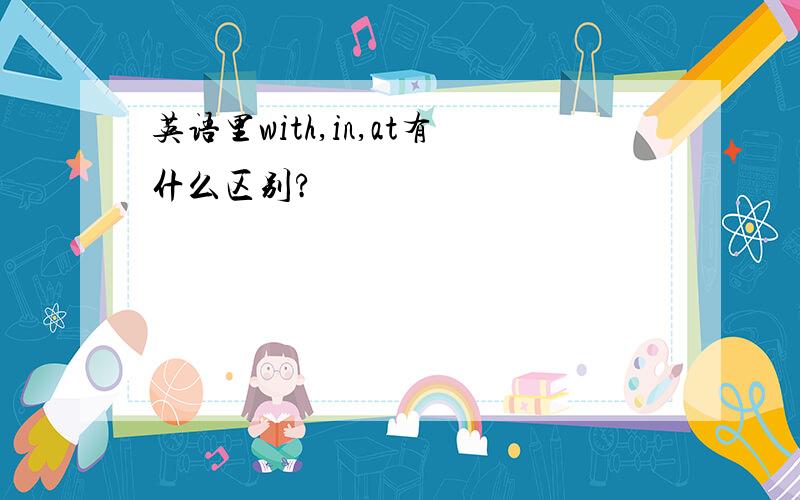英语里with,in,at有什么区别?
来源:学生作业帮助网 编辑:作业帮 时间:2024/11/27 14:45:21

英语里with,in,at有什么区别?
英语里with,in,at有什么区别?
英语里with,in,at有什么区别?
1.at
【性格展示】介词at表时间、表地点.
(1)at表示时间,用于钟点前,用于时刻前,译为"在……时(刻)".如:
at three/three o'clock在三点.
at a quarter to six六点差一刻.
at noon在中午,at night在夜晚,at midnight在半夜
at breakfast/lunch/supper在吃早饭/午饭/晚饭时
at this time of day在每天这个时候
(2)at表示地点,一般用于较小的地名(方)前,译为"在……".如:
at home在家,at the station在车站
(3)at表示处于……状态,译为"从事于……".如:
at school在上学,at work在工作
【相关链接】at加名词一般可与现在进行时态互换使用,表示正在进行的动作,试比较:They are at work./They are working.
2.in
【性格展示】小小介词in,用途却很多.可表时间,表地点,表手段、方法、材料.
(1)in表示时间,用于泛指一天的上午、下午、晚上等;用于某个较长的时间,如年、月、季节等.如:
in the morning/afternoon/evening在上(下午)或晚上,in 2003在2003年,in the day/daytime在白天
【相关链接】in还可以表示"从现在起一段时间以后".如:
They will see you in a week.他们将在一周后去看你.
另外,in和at都可以表示时间,但in表示较长的时间,而at表示时间的某一点.例如:
He got up late in the morning and had a meal at noon.他早上起得晚,所以只吃午餐.
(2)in表示地点、场所,译为"在……里"、"在……中".如:in the factory在工厂,in the room在房间里,in the sun在阳光下,in the middle of...在……的中央
【相关链接】in和at都可表示地点,而in表示的地点比at所表示的地点大.
(3)in表示用语言,用……材料.译为"用……,以……方式".如:in English用英语,in ink用墨水
(4)in表示穿戴的状态,译为"戴着、穿着".如:in the white shirt穿着白色的衬衫,in the cap戴着帽子
【相关链接】in表示"穿(戴)着"是介词,指状态,同wear一样.in后接表示服装类的名词或表示颜色的词.如:
Kate is in a red skirt./Kate wears a red skirt.凯特穿着红裙子.
3、with
prep.
(表示关系)和…在一起
Would you like to go to the street with me?
你愿和我一起上街吗?
(表示状态)具有,带有
Many exhibits with characteristics of the Chinese art are on display.
许多具有中国艺术特色的展品陈列出来.
(表示方式)用,以,藉
The room is cooled with air conditioner.
这房间用空调降温.
(表示对象)对…,关于
She was always good with the unfortunate.
她对不幸的人总是很友好.
(表示伴随)与此同时,随着
I always rise with the bell.
我总是听到铃声就起床.
(表示让步)虽然,尽管
With all his abilities,he failed completely.
尽管很能干,他还是一败涂地了.
(表示原因)由于,因为
She flushed with delight.
她高兴得脸上通红.
(表示态度)支持,赞同
Is he with us or against us?
他赞成我们还是反对我们?
(表示态度)跟(…对抗)
We are struggling with backwardness.
我们在和落后现象做斗争.